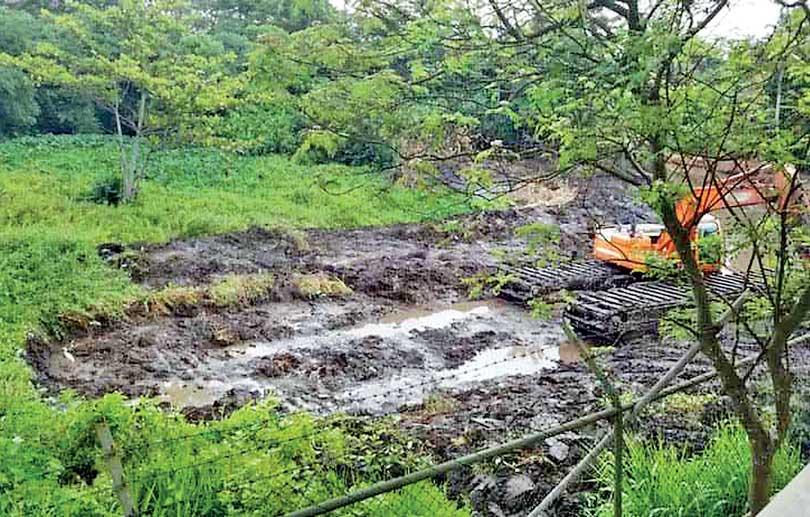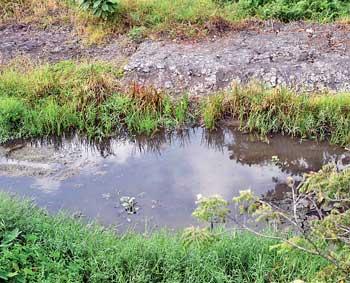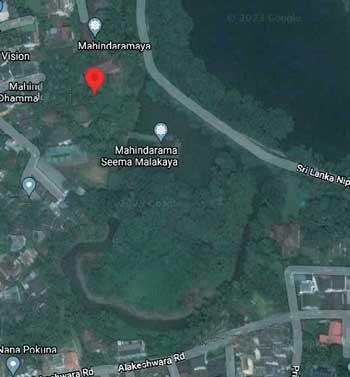31 Aug 2023 - {{hitsCtrl.values.hits}}

Destroying an ecologically significant location (Pics by Kushan Pathiraja)
But with the digging of the canal the wetland patch now has limited ability to retain rainwater and continue its sponge effect
The canal not only changed the vegetation paving the way for alien invasive species to grow, but even the larger trees are now dying
Another claim being made is that the temple wants to ‘conserve’ this patch of land as a private biodiversity park
 A purple necked grey heron was patiently aiming at its prey, ignoring the sounds of a busy city in the distance. We were admiring a natural wetland patch, particularly home to this species and many other endemic flora and fauna in Colombo’s capital city, Sri Jayawardenapura, Kotte. This wetland patch was declared as the Sri Jayawardenapura Kotte wetland sanctuary in 1985 and is one of the most ecologically and environmentally sensitive wetland habitats in Colombo. Despite its significance, a 20 foot canal had been dug sans necessary approvals from authorities and the Daily Mirror reliably learns that these activities are being carried out by a private party with vested interests.
A purple necked grey heron was patiently aiming at its prey, ignoring the sounds of a busy city in the distance. We were admiring a natural wetland patch, particularly home to this species and many other endemic flora and fauna in Colombo’s capital city, Sri Jayawardenapura, Kotte. This wetland patch was declared as the Sri Jayawardenapura Kotte wetland sanctuary in 1985 and is one of the most ecologically and environmentally sensitive wetland habitats in Colombo. Despite its significance, a 20 foot canal had been dug sans necessary approvals from authorities and the Daily Mirror reliably learns that these activities are being carried out by a private party with vested interests.
Residents in a dilemma
 The land in question is located adjacent to the Sri Mahindaramaya Temple in Ethul Kotte. Residents however claim that a canal is in the process of being dug since March last year at a time when the country was facing a fuel crisis and when only essential work was being carried out. “There was a backhoe that operated from 8.00 am to 5.00 pm daily and they even brought 12 litres of fuel every day,” claimed a resident who spoke on conditions of anonymity. “This wetland patch not only provided us with much privacy, but it also saved the neighbourhood from mosquitoes. But with the digging of the canal the wetland patch now has limited ability to retain rainwater and continue its sponge effect. There’s no vegetation growing in places where the peat has been dredged. The canal not only changed the vegetation paving the way for alien invasive species to grow, but even the larger trees are now dying. With more water collecting in the canal it is now a breeding ground for mosquitoes. Can we hold the authorities accountable if residents get infected with dengue,” The resident further questioned.
The land in question is located adjacent to the Sri Mahindaramaya Temple in Ethul Kotte. Residents however claim that a canal is in the process of being dug since March last year at a time when the country was facing a fuel crisis and when only essential work was being carried out. “There was a backhoe that operated from 8.00 am to 5.00 pm daily and they even brought 12 litres of fuel every day,” claimed a resident who spoke on conditions of anonymity. “This wetland patch not only provided us with much privacy, but it also saved the neighbourhood from mosquitoes. But with the digging of the canal the wetland patch now has limited ability to retain rainwater and continue its sponge effect. There’s no vegetation growing in places where the peat has been dredged. The canal not only changed the vegetation paving the way for alien invasive species to grow, but even the larger trees are now dying. With more water collecting in the canal it is now a breeding ground for mosquitoes. Can we hold the authorities accountable if residents get infected with dengue,” The resident further questioned.
Baseless allegations ?
 However, speculation is rife whether the aforementioned temple has anything to do with the ‘development activities.’ One of the claims is that the temple is planning to open a jogging path for its devotees. Another claim being made is that the temple wants to ‘conserve’ this patch of land as a private biodiversity park. But why Kotte needs another biodiversity park in addition to the Beddagana Wetland Park and the Diyasaru Park remains a doubt.
However, speculation is rife whether the aforementioned temple has anything to do with the ‘development activities.’ One of the claims is that the temple is planning to open a jogging path for its devotees. Another claim being made is that the temple wants to ‘conserve’ this patch of land as a private biodiversity park. But why Kotte needs another biodiversity park in addition to the Beddagana Wetland Park and the Diyasaru Park remains a doubt.
When questioned, the Chief Priest of Sri Mahindaramaya Temple Ven. Meegahathenne Chandrasiri said that the temple is not constructing any biodiversity park. “Look at the Seema Malakaya of this temple.It has been built in such a way so that the environment doesn’t get disturbed. I don’t have any involvement with this so-called construction. How can I construct a private park on a government land? In fact that patch of land comes under the purview of the UDA and they have constructed a canal, so that people won’t encroach this area. Whoever who mentioned my name in this matter doesn’t know the truth. Those residents who are encouraging the press to write about this matter are making baseless allegations. Nobody talks about the number of trees that I have planted in this temple,” the priest said.
However, when asked if the temple had attempted to purchase the land in question Ven. Chandrasiri failed to provide a clear answer. “I receive donations from humble donors and I invest these donations in developing this temple. People have already filed petitions against me. There is a canal that runs in front of my temple and I was perhaps unaware of obtaining certain approvals. But now I have submitted all approvals to the necessary departments. What am I supposed to do if they are delaying the process,” Ven. Chandrasiri questioned.
However the chief incumbent didn’t allow us to visit the land in question and kept repeating the fact that it is a project undertaken by the UDA and that it is not appropriate to be clicking photos at this point.
Have the authorities evaded the law?
Section 7(1) b of the FFPO as last amended by Act No.22 of 2009 states that any action harmful to the fauna and flora or to the existence of a part of a Sanctuary declared under section 2(2) of the Ordinance, is illegal.
Under section 23 of the National Environmental Act No.47 of 1980 as amended, any development project within a Sanctuary or even outside it, but within 100 metres of its boundary, requires written consent from the CEA obtained after a prior detailed process, including submission of a report on its environmental impact. Without this procedure no State institution can be given permission to conduct any development activity on such land.
This area is also part of an archeological site in terms of the Antiquities Ordinance No.9 of 1940 as amended due to being part of the ancient Kingdom of Kotte, with its rampart very probably crossing it. In terms of sections 43(a) and 47 of the said Ordinance, prior to filling a wetland or other land there must be an Archaeological Damage Assessment report and then approval obtained from the Director-General of Archaeology. Environmental experts observe that none of these approvals have been obtained prior to constructing the canal.
Residents however observe that several authorities are involved in this matter. The fact that the Sri Lanka Land Development Corporation provided the machinery for the construction of the canal and the stance maintained by the UDA too are concerning.
Commenting on the matter, UDA Director General Prasad Ranaweera claimed that the chief incumbent of the temple had requested for the land in question through a proposal. “But the canal had been dug without our knowledge. We subsequently filed a police complaint and a court case,” said Ranaweera.
But Ranaweera failed to provide us with the case number as he later said that the case had been filed by another party. The Daily Mirror also learned that the police complaint had been withdrawn minutes after it was filed. But Ranaweera denied this claim. He further said that he is unaware of the machinery hired for the said construction and that as of now all activities have been halted.
The Daily Mirror then attempted to speak to Sri Lanka Land Development Corporation (SLLDC) to inquire about the matter. After several rounds of calls which were transferred from the Drainage and wetland management division to the special projects division, back to the telephone operator and the Deputy Director General, an official suggested that the necessary information could be obtained from the Additional General Manager’s office. After several attempts, the Daily Mirror got in touch with SLLDC’s Additional General Manager (Implementation) C.B. Amarasinghe who initially refused to provide any information to the media. But after repeated queries Amarasinghe said that they initially received a request from the temple to ‘protect’ the land in question from encroachers. “Even residents have written to us on attempts to encroach this area. This is why we demarcated an acquisition border and subsequently dug a canal, so that people will not be able to access this land. That was our only task. But if any further project is being done the necessary environmental impact assessments and approvals need to be sought as this is an environmentally sensitive area,” said Amarasinghe.
But on the contrary, from the residents’ perspective it looks like the authorities conveniently separated this patch of land to make things easier for the temple. They claim that since the canal has now been dug it is easier for people to encroach this land. When the Daily Mirror visited the area, signs of encroachment were already very evident. However it is unclear as to who funded the construction of this canal.
The residents have initially written to the Department of Wildlife and Conservation and in response to their queries, a letter was issued by the department’s Natural Resources division claiming that they will look into the matter. A flying squad was dispatched on two occasions when residents complained about these activities and the Department had even warned offenders that legal action would be taken. But several attempts made by the Daily Mirror to contact the DWC’s Natural Resources division proved futile.
09 Jan 2025 2 hours ago
09 Jan 2025 4 hours ago
09 Jan 2025 6 hours ago
09 Jan 2025 7 hours ago
09 Jan 2025 8 hours ago